|
|
|
Sort Order |
|
|
|
Items / Page
|
|
|
|
|
|
|
| Srl | Item |
| 1 |
ID:
109834


|
|
|
| 2 |
ID:
114823
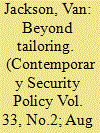

|
|
|
|
|
| Publication |
2012.
|
| Summary/Abstract |
How can one state maintain deterrence against another state undergoing an uncertain political transition? A debate within fourth wave deterrence theory focuses on whether and when a tailored approach, based on cultural, organizational, and idiosyncratic characteristics of a target state, has the greatest value. Tailored deterrence may not be appropriate under conditions of domestic political uncertainty in the target state, often those most in need of deterring. A more promising alternative for a defending state may be deterrence management. Deterrence management compensates for insufficient or low-confidence assessments of a target's values, organizational structure, power distribution, or cultural idiosyncrasies that prevent employment of tailored deterrence strategies intended to manipulate such factors. To make this case, I combine insights from deterrence theory with an exploration of the uncertain politics of a post-Kim Jong-il North Korea and the unpredictable process of power consolidation. Deterrence management may be applicable in cases of imperceptible leadership transitions in other target states. While no panacea, the deterrence management approach reinforces stability while remaining flexible enough to accommodate change.
|
|
|
|
|
|
|
|
|
|
|
|
|
|
|
|
| 3 |
ID:
096013


|
|
|
|
|
| Publication |
2010.
|
| Summary/Abstract |
Climate change is a new variable that may weaken the Kim Jong-il regime by disrupting North Korea's agricultural sector, leading to greater food insecurity and erosion of the state's institutions. North Korea has limited capacity to adapt to climate hazards, which could exacerbate existing stresses and push the regime into terminal decay.
|
|
|
|
|
|
|
|
|
|
|
|
|
|
|
|
| 4 |
ID:
107650
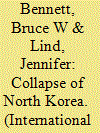

|
|
|
|
|
| Publication |
2011.
|
| Summary/Abstract |
In North Korea, the upcoming leadership transition in the Kim Jong-il regime will be a precarious time for the Kim family's hold on power. A collapse of the North Korean government could have several dangerous implications for East Asia, including "loose nukes," a humanitarian disaster, a regional refugee crisis, and potential escalation to war between China and the United States. To respond to a collapse and these problems, neighboring countries may perform several military missions to stabilize North Korea. These include the location and securing of North Korean weapons of mass destruction, stability operations, border control, conventional disarmament, and combat/deterrence operations. Assuming that collapse occurs in a relatively benign manner, military missions to stabilize North Korea could require 260,000 to 400,000 troops. If collapse occurs after a war on the peninsula, or if it sparks civil war in North Korea, the number of missions-and their requirements-would grow. Because of the size and complexity of these missions, and because of the perils associated with mismanaging them, advance and combined planning is essential. Combined planning should include those actors (e.g., China, South Korea, and the United States) that could otherwise take destabilizing action to protect their own interests.
|
|
|
|
|
|
|
|
|
|
|
|
|
|
|
|
| 5 |
ID:
115058
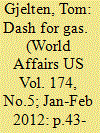

|
|
|
|
|
| Publication |
2012.
|
| Summary/Abstract |
For a fresh perspective on geopolitical trends, look at the world through the lens of the natural gas trade. One of the reasons for Israeli unease with the Arab Spring is that the democratic uprising that took down Hosni Mubarak also brought interruptions in Israel's supply of natural gas, much of which since 2008 has come from Egypt. Wondering about China's new interest in Australia and Qatar? It's about their abundant gas supplies and China's tremendous energy needs. Desperate for signs of cooperation from North Korea? Check out reports that Kim Jong-il may agree to the construction of a natural gas pipeline that would link Russia, Pyongyang, and Seoul. From Asia to the Middle East to North America, a boom in natural gas usage is rearranging international connections, with major repercussions for global politics.
|
|
|
|
|
|
|
|
|
|
|
|
|
|
|
|
| 6 |
ID:
160672


|
|
|
|
|
| Summary/Abstract |
North Korea's engagement in the Middle East is a six-decade long narrative. Neither the DPRK nor its Middle Eastern partners have remained still over this time; each region has undergone significant changes. In particular, the leadership of the North Korea is now in the hands of the third generation. No matter how stagnant and monolithic the country may seem at first sight, each generation has had to deal with differing commitments and adapt to changing realities. As such, each generational change of leadership in Pyongyang has arguably had repercussions on the DPRK's relationship Middle Eastern partners, which may at times have been misattributed to a fundamental change of approach. This study attempts, therefore, to probe the twists and turns in the DPRK's interactions with the Middle East since the death of Kim Il-sung, beginning with an appraisal of each leaderships’ priorities in North Korea, and how they could potentially influence Pyongyang's overall orientation toward its different partners in the region.
|
|
|
|
|
|
|
|
|
|
|
|
|
|
|
|
| 7 |
ID:
106321


|
|
|
|
|
| Publication |
2011.
|
| Summary/Abstract |
The future of the two Koreas has a great influence on the security landscape of Northeast Asia. Because of this, an exploration of a variety of future possibilities regarding the rapidly changing Korean Peninsula and preparation for a sudden change is timely in order to avoid any catastrophic result. This article suggests two likely scenarios for the future of the two Koreas and assesses these two by exploring critical uncertainties that lie ahead. It argues that internal conditions, such as the North's nuclear weapons program, its ongoing political transition process, and the policies of regional powers such as the United States, are the most important factors in determining future outcomes on the Korean Peninsula. Based on a thorough exploration of these critical uncertainties, it concludes that policy-makers of the South Korean government and regional powers should take seriously the possible North Korean collapse scenario, while making every effort to promote peace on the Korean Peninsula by creating a stable North Korea.
|
|
|
|
|
|
|
|
|
|
|
|
|
|
|
|
| 8 |
ID:
112435


|
|
|
|
|
| Publication |
2012.
|
| Summary/Abstract |
As China's economic and foreign policies increasingly move away from the country's past socialist ideals, Beijing's attitude towards the DPRK has, in recent years, begun to subtly change. However, the close historic ties that exist between the two ruling communist parties prevent such changes from being overtly publicized in official discourses; criticizing the DPRK in China readily results in serious protests from Pyongyang. The popular perception in China of the DPRK, which is far more critical than the official version, is, on the other hand, hard to hide. In an authoritarian nation where exhibiting sentiments contrary to the party-state's policy is still not a safe and established practice, the Chinese people have increasingly relied on the platform of the Internet to express their views on various aspects of policy, including that towards the DPRK. This makes the Internet a rich resource for academics to gauge down-to-earth public opinion and how it contrasts with the official policy. Drawing on systematic, qualitative research on the online community, this article wishes to explore the possible differences between the written policy of Beijing and popular Chinese perceptions, or consensus if any, towards Pyongyang. The article is written in three parts. The first reviews the relevant literature on Beijing's contemporary policy towards the DPRK, the role of Internet opinions in Chinese foreign policy making, and introduces our methodology. The main part of the article typologizes and analyses the images as perceived by Chinese Internet users of the DPRK, its leaders and polices, as well as Beijing's DPRK policy, in order to highlight the differences between official policies and online opinions. Explanations for the discrepancies with the official line and the possible implications of our findings for China's future policy on the DPRK are discussed in the concluding section. As witnessed from the research, surprisingly, there was relative consensus of opinion among the different available viewpoints towards the DPRK regime, as both the Chinese nationalists and the liberals are likely to pressure Beijing to walk further away from Kim Jong-il in the future.
|
|
|
|
|
|
|
|
|
|
|
|
|
|
|
|
| 9 |
ID:
115613
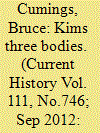

|
|
|
|
|
| Publication |
2012.
|
| Summary/Abstract |
The North's philosophy of rule bears close resemblance to what Koreans traditionally said about their kings-or what Hegel said about the German monarch. .
|
|
|
|
|
|
|
|
|
|
|
|
|
|
|
|
| 10 |
ID:
115064
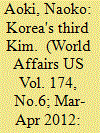

|
|
|
|
|
| Publication |
2012.
|
| Summary/Abstract |
The death of Kim Jong-il and subsequent dynastic transfer of power in North Korea caused a spasm of hope in the policy community that the secretive and totalitarian nation might embark on economic and political reforms. As the new leader, Kim Jong-un, was exposed to Western affluence while receiving his education in Switzerland-so the wishful thinking goes-surely he would realize the benefits of opening up his country. In fact, the young and inexperienced scion of the Kim dynasty derives his legitimacy solely from his family heritage. He has every reason to perpetuate the oppressive system built by his grandfather and buttressed by his father. In fact, how much Kim Jong-un's ideas and beliefs matter will remain questionable, at least over the short term. It is reasonable to assume that the untested leader will be guided by guardians or perhaps regents. This means that he may not be the one calling the shots, at least for the time being. The opaqueness of the power structure, meanwhile, has important implications for the outside world. The consolidation of power is likely to be still in progress, and it would take months-possibly even longer-for outside observers to learn how policies are determined. With Kim Jong-il, the world at least knew with whom it was dealing. Under Kim Jong-un, we may not even enjoy that advantage for some time to come.
|
|
|
|
|
|
|
|
|
|
|
|
|
|
|
|
| 11 |
ID:
121149
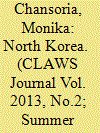

|
|
|
| 12 |
ID:
086683
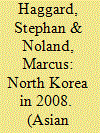

|
|
|
|
|
| Publication |
2009.
|
| Summary/Abstract |
In 2008, North-South relations worsened, food shortages re-emerged, and the Six Party process yielded an interim agreement. The U.S. dropped North Korea from the terrorism list but nuclear verification issues remained contentious. Kim Jong-il reportedly suffered a stroke in August, casting uncertainty over all aspects of politics and policy.
|
|
|
|
|
|
|
|
|
|
|
|
|
|
|
|
| 13 |
ID:
103622
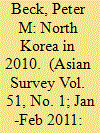

|
|
|
|
|
| Publication |
2011.
|
| Summary/Abstract |
The North killed 50 South Koreans in two audacious strikes, revved up its nuclear programs, and prepared for a third generation of Kim family rule. At the same time, a tight embrace of China still means hardship and hunger for millions of North Koreans.
|
|
|
|
|
|
|
|
|
|
|
|
|
|
|
|
| 14 |
ID:
113908
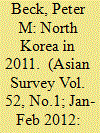

|
|
|
|
|
| Publication |
2012.
|
| Summary/Abstract |
North Korea underwent a seemingly seamless leadership transition from father to son in the midst of a struggling economy and widespread hunger. The North drew even closer to China but also reached out to the United States and Russia for the first time in several years. Meanwhile, inter-Korean relations remained in a deep freeze.
|
|
|
|
|
|
|
|
|
|
|
|
|
|
|
|
| 15 |
ID:
111529


|
|
|
| 16 |
ID:
097754


|
|
|
|
|
| Publication |
2010.
|
| Summary/Abstract |
Speculation about the future of the North Korean regime has been intense for nearly two decades. In the 1990s, economic crises and famine led to predictions of the Kim regime's imminent downfall. Today analysts highlight impending famine as well as threats to the regime's position brought by eroding information control. Several theories of authoritarian control help to explain how Kim Jong-il and his family have remained in power and how this might change over time. The Kim regime has employed a variety of authoritarian "tools" to protect itself both from popular revolt and from internal coups. Its social policies, reliance on certain ideas and nationalism, and use of force prevent the onset of revolution. Through numerous other tools (elite co-optation, manipulation of foreign governments for financial aid, and the "coupproofing" of domestic institutions), the regime protects itself from coups d'état and elite unrest. This framework not only helps to explain the past resilience of the regime, but it suggests that the regime is not in danger of being unseated by coups or revolution. Yet it also suggests that the regime has not adequately prepared for succession after Kim's death. This analysis has implications for policy planning about the future of the Korean Peninsula, as well as for negotiations with and coercive strategies toward Pyongyang.
|
|
|
|
|
|
|
|
|
|
|
|
|
|
|
|
| 17 |
ID:
115423
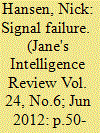

|
|
|
| 18 |
ID:
095755
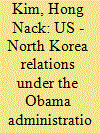

|
|
|
|
|
| Publication |
2010.
|
| Summary/Abstract |
North Korea's nuclear weapons program has been a major headache for the U. S. throughout the post-Cold War era. Pyongyang's attempt to develop nuclear weapons got the nation into serious problems with both the Clinton administration (1993-2001) and the Bush administration (2001-2009), as both U. S. administrations maintained that the nonproliferation of nuclear weapons was essential for the preservation of the existing international order. Although the U. S. succeeded in persuading North Korea to give up its nuclear weapons program through the six-party talks by September 2005 (i.e., the September 19 Joint Statement), Pyongyang did not fulfill its commitment on denuclearization by the end of 2008. As a result, the Obama administration has inherited the unfinished task of implementing the agreement on North Korea's denuclearization.
The purpose of this paper is to examine U. S.-North Korean relations during the early phase of the Obama administration with emphasis on the analysis of the administration's handling of the North Korean denuclearization issue from the time of its inauguration in January 2009 to the present. Like his predecessors, President Obama is determined to bring about the denuclearization of North Korea, because the proliferation of nuclear weapons by a rogue nation such as North Korea could not only pose serious threats to the U. S. but also spell the end of the nuclear nonproliferation regime. Unless North Korea returns to the Six-Party Talks for denuclearization, the U. S. will not relax sanctions against Pyongyang.
|
|
|
|
|
|
|
|
|
|
|
|
|
|
|
|
|
|
|
|
|